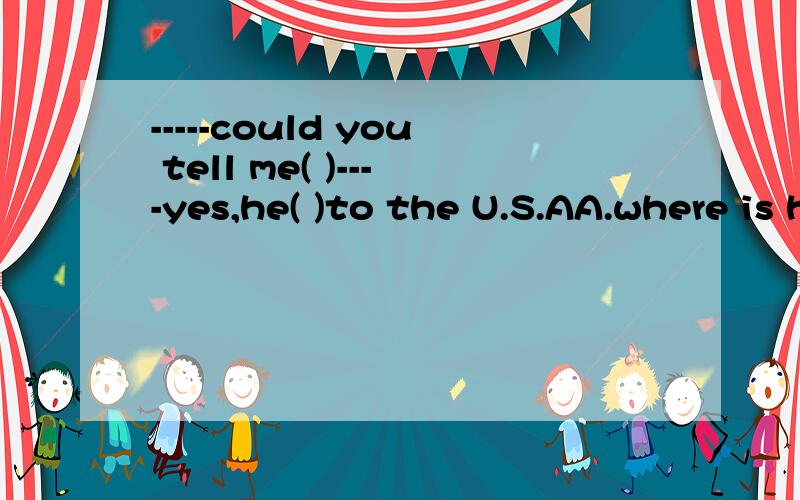-----could you tell me( )----yes,he( )to the U.S.AA.where is he;has been B.where he is; has gone C.where was he;has been D.where he was;has gone我选D.could在这里不能看成是can的过去式吗?
来源:学生作业帮助网 编辑:作业帮 时间:2024/11/29 04:25:19

-----could you tell me( )----yes,he( )to the U.S.AA.where is he;has been B.where he is; has gone C.where was he;has been D.where he was;has gone我选D.could在这里不能看成是can的过去式吗?
-----could you tell me( )----yes,he( )to the U.S.A
A.where is he;has been B.where he is; has gone
C.where was he;has been D.where he was;has gone
我选D.could在这里不能看成是can的过去式吗?
-----could you tell me( )----yes,he( )to the U.S.AA.where is he;has been B.where he is; has gone C.where was he;has been D.where he was;has gone我选D.could在这里不能看成是can的过去式吗?
这里的could只是表一种委婉的语气,并不是指can的过去式,情态动词都有些类似的特性,例如will和would,在不同情况下,would有时是will的过去式,而有时则表示为一种较委婉的语气
例如:
(could可以看作是can的过去式,这两个词除了时态不相同外,在表达意思的许多方面是相同的.当然could也有自己独特的用法.)
1)表示脑力或体力上的能力
Nobody can stop the development of science .
谁也无法阻止科学的发展.
She can sing that song in English.她能用英文唱那歌.
He can submerge to a depth of about twenty meters .
他能潜入约二十米深的水中.
He could hardly support his family before he found the new job .他在找到那份新工作前几乎无 法养家.
I could not understand the lecture on the computer given by Mr. Smith .
我听不懂史密斯先生作的那个关于计算机的讲座.
2)表示客观上的可能性
You can borrow this useful book from the library .
你可以从图书馆借到这种有用的书.
A more suitable person than him for the job can not be found . 不可能找到比他更适合这份工作的人了.
Now people can skate on the lake .现在人们可以在湖上滑冰了.
When the storm stopped , the plane could take off .
当风暴停下来时,飞机可以起飞了不得.
3)表示主观上的允许
Can I ask you some questions about it ?
我可以问你有关这件事的几个问题吗?
You can not leave here till I come back .直到我回来你才能离开.
Such kind of thing can't happen any more later .
这类事以后不准再发生了.
Can you tell me how to get to the airport ? 你能告诉我怎么去机场吗?
Could you tell me how to get to the airport ?
您能告诉我怎么去机场吗?
Could I be forgiven my negligence ? 请原谅我的疏忽,行吗?
4)(用于否定句、疑问句或感叹句中)表示猜测、怀疑或惊诧
How can / could you be here ? 你怎么会在这儿?
She couldn't / can't be so stupid to do that .
她不可能蠢得去做那种事吧.
He couldn't / can't be over seventy .他不可能有七十多岁了.
Where could / can the boy be now ? 那孩子现在能在哪儿呢?
另外,could还常用于表示较客气委婉的看法、提问及用于虚拟语气的结构中.这时候,could就不可以看作是can的过去式了.而是could自己独特的用法.如:
Could you speak a little slowly ?
您能稍微说慢一点儿吗?
I'm afraid that we couldn't give you any definite answer at this moment .
恐怕我们这时候还无法给予您任何确切的答复.
I could come earlier if asked .
如果要让我早一点来,我可以来早一点.
We would appreciate it if you could offer us any help .
如果您能为我们提供帮助的话,我们将不甚感激.
You could have done better if you had worked harder at it .
如果你再加把劲,本来可以干得更好一些的.
Could这里只是一种委婉的说法,跟时态没什么关系